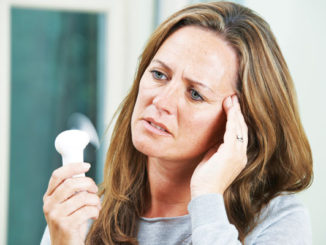
Adult acne, mood swings, and weight gain—oh my!
Sure, mood swings, weight gain, fatigue, skin issues and even depression and anxiety sound like typical hormonal symptoms the average, healthy woman experiences from time to time—but are they signs of something more? According to the Women’s Health Network, seemingly typical symptoms could potentially be caused by a more serious, and all-too-often ignored, hormonal imbalance issue. Yes, the hormonal imbalances you’re experiencing could be caused by PMS, pregnancy, or even menopause, but for many women there can be underlying medical concerns.
Hypothyroidism, or a condition when the thyroid gland becomes overactive, for example, causes hormonal changes like insomnia, moodiness, panic attacks, and depression.
Adrenal disorders, which are imbalances in the body’s stress hormones adrenaline and cortisol, can also cause symptoms of insomnia, anxiety, and depression. Hormonal imbalances can also be caused by blood sugar imbalances, progesterone deficiencies, and even a condition known as Polycystic ovarian syndrome (PCOS), in which cysts develop on the ovaries.
Unfortunately, because the symptoms for hormonal imbalances straddle the symptoms of clinical depression and other mental disorders, many physicians are quick to prescribe antidepressants depressions-treatment-info to patients with these complaints and neglect to investigate underlying causes.
So how do you know if you have a hormonal imbalance? First, listen to your body. Pay attention to the symptoms you’re experiencing and keep track of their frequency and severity. If you find your symptoms are increasing, even by a small margin, seek help from your physician but be specific as to what you’re experiencing and don’t hesitate to ask for hormone testing.
Saliva, blood tests, and hair follicle tests exist to help determine whether hormone imbalance is the cause of persistent symptoms. And if it is the culprit, there are many effective treatments that can help restore balance. Most doctors treat imbalances with hormone replacement therapy. Biodentical hormones, which are natural and biochemically identical to human hormones such as estrogen, progesterone, DHEA, and even testosterone, can be highly effective for women. Synthetic hormones created by pharmaceutical companies intended to mimic natural hormones are another option. However, they pose a slightly higher risk and can have adverse effects but are sometimes necessary in severe cases.
Ultimately, no one knows you better than you and most of us know when something just isn’t quite right. Don’t let the messages your body is sending go unnoticed, and inform your physician of what you’re experiencing as early as possible to bring balance.




